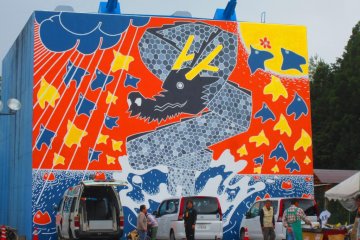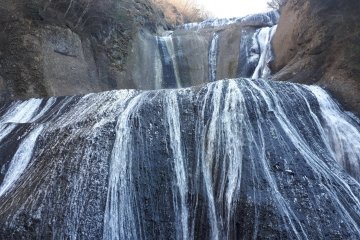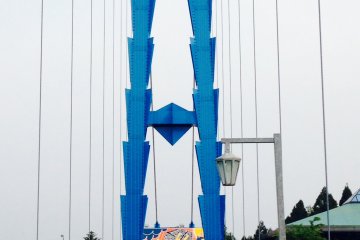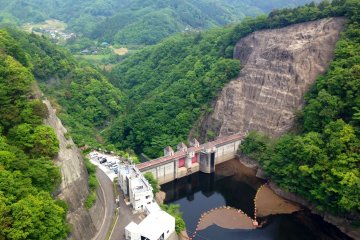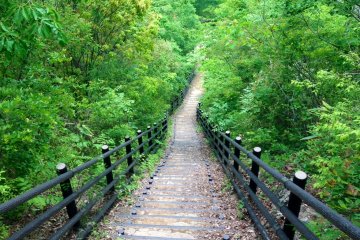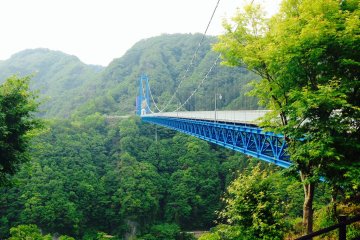It's going on one o'clock when we pull up to Ryujin Bridge in Ibaraki's Oku-Kuji Prefectural Natural Park. The 1.5 hour drive from Utsunomiya gave us plenty of time to think about what we were about to do, allowing hints of nervousness to creep into our stomachs. As we reach the end of the road, a massive sky blue piece of steal comes into view, cutting across an evergreen canyon and a V-shaped ravine below. At the time of its opening in 1994, Ryujin Bridge was the second longest conventional suspension pedestrian bridge in the world at 1,230 feet (375 meters). It remains the longest bridge on the main island of Japan but has no purpose other than serving as a prime viewing spot for koyo (colorful leaves) during the fall months. A spectacular footbridge, essentially, to nowhere.
Our reservation isn't until four, so we have plenty of time to explore the area. While crossing the bridge, we gaze up at the unusual steel fins protruding from the towers. The fins make the bridge look like it's cutting out a part of the sky. With a deep truss and a wide deck, the overbuilt design was supposed to make a walk across the bridge less fearful for those who are afraid of heights. Looking down through the plexi glass windows to the water 300m below, however, does not help our fears. We begin to feel the vertigo sinking in.
At the end of the bridge, our eyes meet the keeper of the bridge- a giant horned dragon. The Japanese regard these powerful imaginary creatures as gods, symbolizing good luck and good fortune. A rather fitting symbol for what we were about to do.
As we head down into the canyon, we pass a viewing deck on our left. From this angle, the less inclined can watch on safely with a perfect view as jumpers plunge into the abyss below. Suddenly, we hear the terrified screams of a female jumper echo deep across the ravine. Our heart rates go up a notch, and we choose not to linger.
A few hundred steep steps later, we reach the bottom of the canyon. A dense, forest trail hugs the trees and guides us towards the Ryujin dam. From above, we hear more screams, fainter this time, but still audible. Giant black butterflies the size of birds with white spots on their wings flitter by, paying no attention to the unusual human activities above. Although the trail goes full circle around the dam, we stumble upon a neon colored snake which chases us back up the canyon the way we came. As we climb back up the hundred stairs, the air grows thicker, and the screams louder. We begin to sweat, from heat or from fear we're not sure. Thankfully, back across the bridge a building with a restaurant and a market selling local foods (including handmade soba) provides a welcome retreat from the hot summer sun. A handful of sweaty visitors are enjoying canteloupe soft serve icecream. It's two thirty now. Only 1.5 hours to go.
We grab some waters and sit down on a bench looking out at the bridge, growing quiet in our thoughts. Although the bridge had been designed for viewing purposes, there were some people that had other ideas for what it could be used for. In March 2014, the daredevil personalities that first brought bungy jumping to Japan in 1995 (Beau Retallick from Australia and Charles Odlin from New Zealand) decided that bigger is in fact better and opened Japan's highest jump at 100 meters. 100 meters of hair-raising, spine-tingling free fall that we were about to willingly embrace. The clock turns three. 1 hour to go.
We reluctantly return to the check in, feeling our adrenaline levels rise as we get strapped into our harnesses. We look at each other silently, knowingly. This is actually happening. We cross the bridge again, this time met with shouts of "Sugoi!" and "Gambate kudasai!" The walk across seems much farther than the first time. A metal gate opens, and we float down to the grated platform. Music is playing, the energy palpable. Marc from Canada and Oli from Essex smile our way as they pull up the latest jumper. Our nerves are now screaming out "Go big or go home!" Leg straps are attached, safety instructions reviewed. What seems like a day goes by as we watch 6 more people jump before us. The clock ticks four. Heads spinning, hearts pounding, mind racing. 5,4,3,2....don't look down! This is the edge of mortality, and we are on it.
It's 4:07 pm on May 25th, 2014. We just jumped off a bridge, and we are more alive than ever.
Site information: Bungy Japan offer's Japan's only bridge bungee jumps in three locations across the country- Minakami (Gunma), Sarugakyo, and Ryujin in Ibaraki. The Ryujin jump costs ¥14,000 + an optional ¥3,500 picture package. Reservations required and can be made on Bungy Japan's website.



